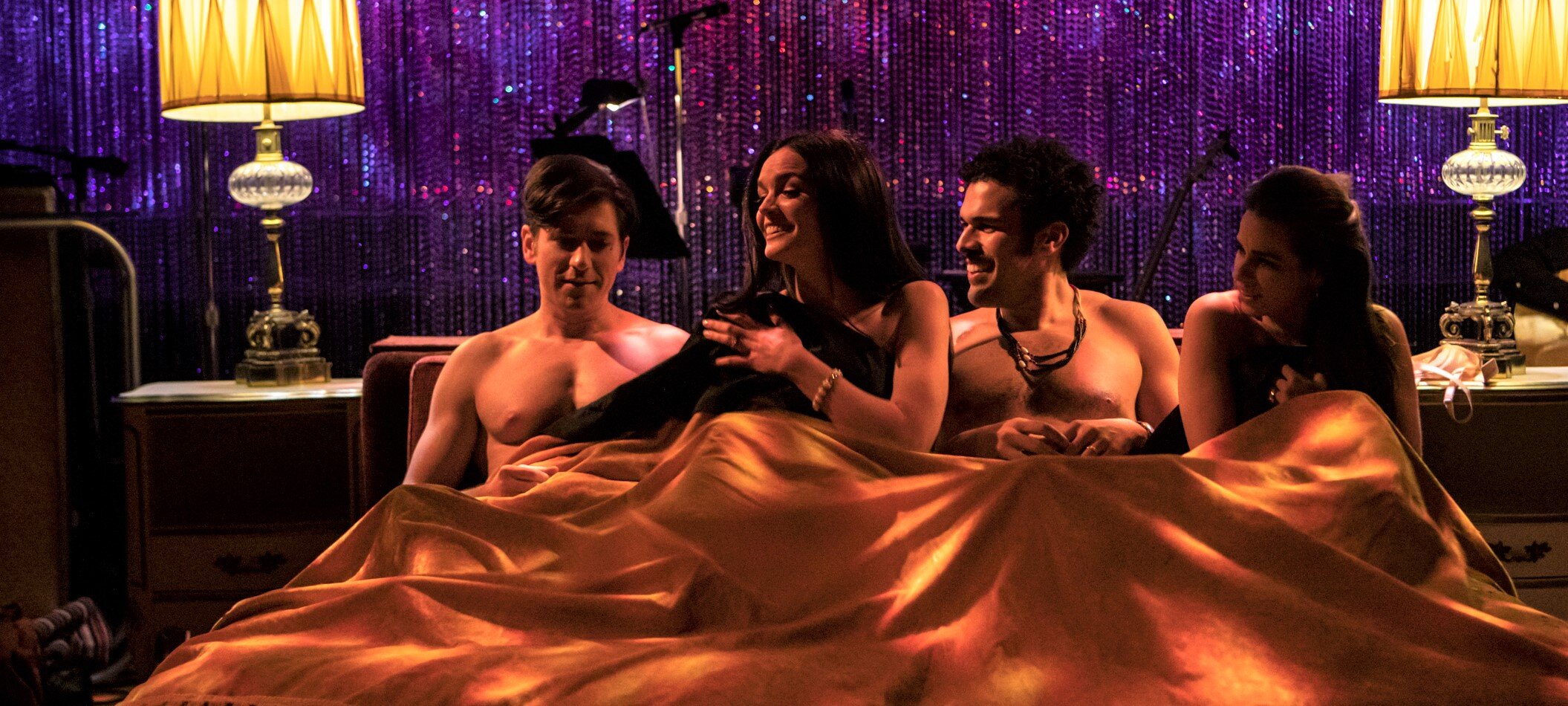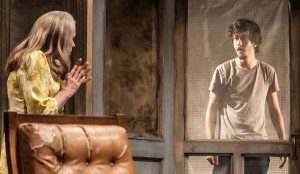In the late 1970s, when playwright Sam Shepard decided to move on from his short experimental works staged at La Mama in the East Village, the Royal Court in London, and the Magic Theatre in San Francisco, he turned to the American theater’s standby—a dysfunctional family. The result was the three-act Curse of the Starving Class. The disintegrating family would be the focus of True West and Buried Child, perhaps his two most famous works, but the seeds are already sprouting wildly in Curse.
Babe
The Oxford English Dictionary lists eight different meanings of the word babe, and that’s not even counting the famous talking pig. Playwright Jessica Goldberg is specifically interested in two of them. In Babe, her 2022 short and sour drama, currently receiving a well-appointed staging by the New Group, Goldberg offers an example of how the term can simultaneously signal affection and condescension. Pitting a powerful, wrong-headed man against two smart women of different generations, the trio admire one another for their singular skills while ruing the destructive power plays that undo their workplace relationship.
The Seven Year Disappear
Part coming-of-age story, part domestic drama, and part mystery tale, Jordan Seavey’s The Seven Year Disappear is a deeply unsettling work that ponders the thorny question: How far should an artist go to mine his or her life for art? Directed by Scott Elliott, Seavey’s play reveals the darker side of the art world, when a renowned artist disappears for seven years and her son goes into free fall.
The Seagull/Woodstock, NY
Anton Chekhov’s 1895 chestnut, The Seagull, has always been a crowd pleaser. The tale of unrequited love and petty jealousy among egomaniacal adults and self-doubting youths, sown through with treatises on the craft of writing and the purpose of theater, then capped with a dead bird and a tragic ending, has spawned eight Broadway productions over the past century.
Black No More
At the Act One climax of Finian’s Rainbow, which premiered 75 years ago, Billboard Rawkins, a bigoted white Southern senator, turns into a black man by the power of a wish. There’s a blackout, and the actor playing Rawkins hurriedly smears blackface on. Obviously you can’t get away with that anymore, and these days, if anyone dares to do Finian’s (they should), there’s a blackout, and a black Rawkins rushes on to replace the white one. However, in the Act One climax of Black No More, a new musical adapted from George S. Schuyler’s 1931 satirical novel, an opposite racial transition happens.
Bob & Carol & Ted & Alice
How exciting and new the film Bob & Carol & Ted & Alice must have seemed when it hit pre-multiplex screens in 1969. Along with such contemporary classics as Midnight Cowboy and Easy Rider, and with the added inducement of major movie stars wearing few clothes, Paul Mazursky’s satire proffered trendy sex; inspired materialistic adults to question their values; laughed about pot, one of the first big releases to do so; spoofed middle-class mores; and served up newly permissible bare breasts, though not Natalie Wood’s or Dyan Cannon’s. As a time capsule, the movie holds up. But why, in 2020, do a musical version?
Happy Talk
Two is company, three’s a crowd, and being alone is unbearable in the New Group’s world premiere of Jesse Eisenberg’s latest comedy-drama, Happy Talk. Unfolding across a series of confrontations where, more often than not, two characters, deep in conversation, are interrupted by the needs of an intrusive third, this play tracks the lives of some strong women and a weak man, all of whom are at the end of their collective rope.
The True
To anyone who grew up in the Albany area before cable television (or, as I did, in western Massachusetts, served only by Albany stations), the name Erastus Corning was inescapable. For 35 years he was the Democratic mayor of the city, and nightly broadcasts featured him prominently. Sharr White’s marvelous new play The True makes Corning (Michael McKean) a central character in a story of what political parties and machine politics once were and, by contrast, what they have become. It has scope, intelligence and terrific writing.
The Whirligig
The actor-playwright Hamish Linklater, born in Great Barrington, an upscale rural community of the Berkshire hills of western Massachusetts, uses the bucolic area as the setting for The Whirligig, his new play. It’s a region with plenty of past literary associations. Edith Wharton has a crucial scene in Ethan Frome take place in Lenox, where she lived; Nathaniel Hawthorne wrote Tanglewood Tales while dwelling in the same town; and Herman Melville turned out Moby-Dick at his home in Pittsfield, the county seat. Much more recently, Lucy Thurber set her Hilltown Plays in the nearby area.
Evening at the Talk House
In 2015 the New Group staged Philip Ridley’s Mercury Fur, a brutal vision of depravity amid the detritus of a wrecked civilization. Now the same company, under the same director, Scott Elliott, is presenting Wallace Shawn’s Evening at the Talk House, a more subdued yet insinuating take on a society heading in the same direction. Yet the atmosphere is vastly different.
Horrors in the Heartland
It’s been 20 years since the Broadway revival of Buried Child, and the production by The New Group at the Pershing Square Signature Center suggests that Sam Shepard’s 1978 Pulitzer Prize-winning play has lost some luster. Echoing classic American dramas of dysfunctional families—notably Who’s Afraid of Virginia Woolf? and Long Day’s Journey Into Night—Shepard’s portrait of the American dream gone awry is a post-Vietnam nightmare that combines melodrama and absurdist elements. The latter can try one’s patience, as Shepard hacks away at American mythology with a scythe.
In Derek McLane’s shabby, brownishly-decorated Illinois farmhouse live three people: Dodge (Ed Harris), a sickly, cantankerous, whiskey-swilling patriarch who lounges on a beat-up sofa with a ratty blanket that is every bit as necessary to him as Linus’s in Peanuts. This feeble figure, whose name evokes Dodge City and Western heroism gone to seed, is married to Amy Madigan’s beady-eyed Halie, a woman who is cuckolding him with the local priest, Father Dewis (Larry Pine), who buys her telltale yellow roses. From him, she also wants public support for a statue of their late son Ansel, a basketball “star,” she claims, who died under mysterious circumstances.
A new inhabitant is another son, Tilden, played by Paul Sparks as mentally challenged in the vein of Lennie Small in Of Mice and Men. Tilden has returned home after 27 years in New Mexico; he is generally soft-spoken as well as soft-headed. He finds corn in the backyard when his parents swear nothing grows there, brings it inside and shucks it. Occasionally, he mutters in a shell-shocked way about a secret and something buried in the yard.
Dodge and Halie have a third son, Bradley (Rich Sommer), who uses a wooden leg after a chain-saw accident. Dodge is terrified that Bradley will sneak in and cut his hair while he’s asleep, and indeed, an emasculation in the manner of Samson occurs at the end of Act I. (Shepard’s 1978 version was three acts; in 1996 he reworked the script, and the current production plays without intermission.)
The couple who upset the apple cart, as it were, are Vince, Tilden’s son and the grandson of Dodge and Halie, and his girlfriend, Shelly (Taissa Farmiga); they drop in on his grandparents while traveling cross-country to see Tilden in New Mexico. (Parent-child communications in this family take a beating: Nat Wolff’s Vince hasn't seen his grandparents in six years; and, of course, he has no idea his father has left New Mexico. Moreover, neither father nor grandfather recognizes Vince, let alone remembers him.)
Both McLane’s set and Susan Hilferty’s costumes do a fine job of conveying realism, but much is left unexplained, and one’s suspension of disbelief often strains under Shepard’s symbolism. Why does Vince leave the house to buy liquor and not return till the next morning? Apparently so Shelly can be victimized by the sadistic Bradley and scorned by Dodge and Halie. And when they turn hostile, why doesn’t she explain more quickly that she is their grandson’s girlfriend? Or warn off Bradley before he takes advantage of her? The stage time that it takes for her to use common sense is, as Mark Twain would say, “a stretcher.”
In a climactic moment, when Halie discovers that the backyard has a bounty of vegetables, she yells to Dodge: “Tilden was right about the corn, you know. I’ve never seen such corn… dazzling. Tall as a man already… Carrots, too. Potatoes. Peas.” The idea that a field of high corn would not have been noticed in the backyard defies realism, as does Halie’s mention of potatoes. If she has not seen the corn until now, how can she possibly claim there are potatoes under the earth? But the symbolism of a harvest sprouting from blood and death is the point, not rationality or realism.
Still, in Tilden’s corn-shucking and later, Shelly’s cutting up carrots, director Scott Elliott brings out the humor, although the two younger cast members pale in gravitas and skill compared with the superb veterans. Elliott also creates a terrific sense of febrile menace and poisoned trust. “You think because people propagate they have to love their offspring?” Dodge asks Shelly. “You never seen a bitch eat her puppies?” Life in this American home resembles a dogfight.
Shepard’s cynical view of American ideals and debased notions of national self-esteem were certainly fashionable in the late 1970s. To a large extent they are still hanging around. But Buried Child, for all the vigor of its performances, feels just a bit stale.
The New Group production of Buried Child will play through April 3 at the Alice Griffin Jewel Box Theatre at the Pershing Square Signature Center (480 West 42nd St., between 9th and 10th Avenues) in Manhattan. Evening performances are Tuesday-Friday at 7:30 p.m., and Saturdays at 8 p.m. Matinees are Saturday and Sunday at 2 p.m., and on Wednesdays at 2 p.m. Tickets are $25-$115 and may be arranged visiting www.thenewgroup.org, or through Ticket Central at 212-279-4200, or in person at 416 West 42nd St. (noon to 8 p.m. daily).
Apocalypse Soon
Societies don’t come much more dystopian than that of Philip Ridley’s brutal and Darwinian Mercury Fur. In this vision of the future, staged in traverse by Scott Elliott for The New Group, Ridley posits a world—specifically New York—in the grip of post-apocalyptic violence. Zoo animals have been gunned down in their cages, riots fill the streets, and drugs are plentiful.
Lanky Elliot (Zane Pais) and his dim-witted brother Darren (Jack DiFalco) have been sent to prepare a derelict apartment for a party; they are rearranging overturned, tattered furniture—though even “tattered” seems too stylish a description for the squalor designed by Derek McLane. Bits of white plaster and black chunks are strewn over the floor; the furniture is worn with holes, and graffiti is on the windows.
The preparations are clandestine, and Elliot and Darren are skittish. They are thrown when they discover that one of the apartments in the abandoned building is occupied, by Naz (Tony Revolori, who played the bellboy in the film The Grand Budapest Hotel). Naz has met Elliot, who at one time was known as “butterfly man in the ice cream truck.” Naz traded an artifact he had looted from the Met for some of Elliot’s drugs, peddled in the form of butterflies—and everyone uses them.
Naz is impressed to hear that Elliot and Darren are working for Papa Spinx, a legendary power broker. Darren pleads with Elliot to let the gentle Naz stay and help them. Elliot reluctantly agrees, but such is the sense of dread, fear, and jangled nerves that director Elliott creates that a tense viewer may want to yell, “Get out of there!”
Yet, other characters soon arrive. They include Lola (Paul Iacono), a drag queen who is Elliot’s lover and has been enlisted to prepare a young Asian boy, known as the Party Piece—for the upcoming event. But things don’t go as planned. The Party Guest has pushed up the date and yet is running late. The light is fading, so that Spinx may have trouble filming. (Splendid work by Jeff Croiter encompasses flashlights and candles, fire and dawn.)
When the gruff Spinx (Sea McHale) arrives, he has with him a blind woman dressed in a ball gown and known as the Duchess. Emily Cass McDonnell invests her with delusion and vulnerability that recall a Tennessee Williams character; a highlight is her attempt to sing “Climb Ev’ry Mountain” from The Sound of Music. (Ironically, Darren earlier recalls a memory of the movie his parents loved—about mountains and “do-re-mi.” But that unalloyed symbol of the triumph of good is a barely perceptible memory.)
Last to arrive is the Party Guest (Peter Mark Kendall), who has promised Spinx a good deal of money to stage a gruesome fantasy of his. Elliot, the most intelligent of the characters, is going along with Spinx only because he has to protect Darren and Lola. Elliot alone remembers history. He reads and he knows the past. “His brains are like the guts of a great white shark,” says Darren, who tells Naz, in a ghoulishly comic yet repellently vulgar rendering, the story of John F. Kennedy and his assassination, but mixes Marilyn Monroe and Hitler into the mangled history.
But, it turns out, Darren’s memory was induced by eating a butterfly, which Elliot presses him to describe. “What did it do to you?” Elliot asks. “Famous people … political leaders … killing them,” Darren answers. And Elliot divines, “Assassination. You ate a red with silver stripes.”
Mercury Fur is strong medicine. Although Ridley has a way with dialogue and description, it’s hard to judge whether his play merely wallows in depravity or is a legitimate assessment of mankind’s capacity for evil. Perhaps it’s so disturbing because the behavior of his characters leaves no doubt that any shred of decency will soon be utter moral desolation.
The New Group production of Mercury Fur plays at the Pershing Square Signature Center (480 West 42nd St. between 10th and 11th Aves. in Manhattan) through Sept. 27. Evening performances are at 7:30 p.m. Tuesday through Friday and 8 p.m. on Saturday. Matinees are at 2 p.m. on Saturday and Sunday. For tickets, visit TheNewGroup.org or TicketCentral.com.
A Spoiler in the Room
In her early film career, Bette Davis set herself apart by being willing to play characters who were unsympathetic; her bad women in Of Human Bondage and Jezebel were her tickets to fame and marked her as different from other studio stars. Jesse Eisenberg is equally unafraid to take on characters who are unpleasant—even loathesome. His performance as the cold and arrogant Mark Zuckerberg in The Social Network won him an Oscar nomination. In The New Group’s production of his play The Spoils, he plays Ben, whose social graces are in much worse shape, and whose behavior is often repellent.
The actor's first two plays, Asuncion and The Revisionist, proved he was a promising dramatist. In the latter, he co-starred with Vanessa Redgrave, whose participation suggests she can spot talent, and, indeed, Eisenberg has not only written himself a terrific part in The Spoils, but he performs it with élan.
Eisenberg’s Ben lives in a high-flying modernist apartment (luxuriously designed by Derek McLane) purchased for him by his father; he shares it with a roommate he found online, Kalyan (Kunal Nayyar). Kalyan has come to the United States from Nepal to study business and has written a book; he’s not wealthy and probably couldn’t have come without Ben’s help. Ben, however, disdains capitalism and has altruistically offered Kalyan the apartment rent-free, though Kalyan is reluctant to take charity. When Ben runs into an old childhood acquaintance, Ted, who works on Wall Street and has the ability to help Kalyan, he is persuaded to bring Ted over for an introduction to Kalyan, even as he belittles Kalyan’s ambition to work on Wall Street.
The playwright builds the tension gradually in different ways. Ben badmouths Ted, particularly since Ted is about to marry Sarah Newburg (Erin Darke), a girl Ben has had a crush on since their ages were in single digits. He must, nevertheless, bolster Kalyan in his quest to land a Wall Street job even though Ben, a failed filmmaker, is disaffected and resentful of financial success in others. He talks an artistic game but he lacks inspiration. “I wish the world wasn’t a fucked up string of unfair situations that I seem to be embroiled in,” he declares with self-pitying confidence. He is also physically graceless, pushing his body into others’ spaces and sprawling all over the furniture.
Nayyar’s Kalyan is just a tad wishy-washy, manipulatable by Ben; Kalyan is devoted to his benefactor but not spineless. He is dating Reshma (Annapurna Sriram), a doctor who mistrusts Ben and speaks her mind to his face—another source of tension. Ben nonetheless tries to pull off outrageous gambits—claiming a back injury at one point—although Reshma suspects he’s faking.
Eisenberg has given the rest of the cast solid parts, and director Scott Elliott has chosen his actors wisely. Michael Zegen’s Ted is a likable, decent guy, not threatening or ruthlessly businesslike but with a blandness that wears thin quickly. Sriram’s impassioned Reshma is often at the side of the stage, texting or making cell phone calls, as any doctor might—Elliott cannily attends to the details. Darke is exceptional as Sarah: mature, sensitive, and yet devoted to Ted. In a crucial scene, Ben confesses a cringeworthy, scatological childhood fantasy to her—one that is prepared for earlier when he tells it to Kalyan. (The playwright gets further mileage out of the story in a re-enactment; three times is a charm.)
In the end, though, Eisenberg’s play is less a portrait of a young generation than a character study of someone who hasn’t found his way and denigrates the paths that others have chosen in order to justify his own failure. The questions that roil underneath it are whether success should be judged on ambition or accomplishments, and whether an artist who cannot make money at his art is really worth anything. Ben attempts to concoct a film, based on the story Kalyan has told him, to impress Sarah; when he presents it to her, she sees immediately how bogus he is.
But Eisenberg’s brief coda highlights another crucial question: Can adults be hamstrung by events in their childhood that they barely remember? If so, he intimates, redemption may be possible. Something good that Ben once did may just help him to redefine himself.
Jesse Eisenberg's The Spoils plays through June 28 at the Pershing Square Signature Center (480 W. 42nd St. between 10th and 11th Aves.). Evening performances are at 7:30 p.m. Tuesday through Friday, and on Sunday, and 8 p.m. on Saturday. Matinees are at 2 p.m. on Saturday and Sunday, with an additional matinee at 2 p.m. on Wednesday, June 24. Tickets may be purchased by calling (212) 279-4200 or visiting ticketcentral.com.






















